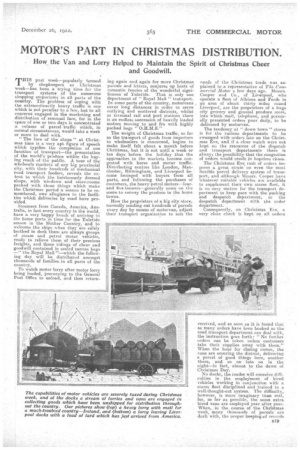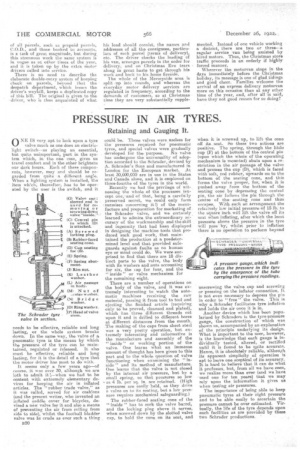MOTOR'S PART IN CHRISTMAS DISTRIBUTION.
Page 11

Page 12

If you've noticed an error in this article please click here to report it so we can fix it.
How the Van and Lorry Helped to Maintain the Spirit of Christmas Cheer and Goodwill.
TH"past week—popularly termed by shopkeepers as Christmas week—has been a trying time for the transport systems of the numerous shopping emporiums in all parts of the country. The problem of coping with the extraordinarily heavy traffic is one which is not peculiar to a few, but to all concerns engaged in the marketing and distribution of seasonal fare, for in the space of one or two days is concentrated a volume of parcel traffid which, in normal circumstances, would take a week or more to deal with.
" The lure of the shops" at Christmas time is a very apt figure of speech which typifies the completion of one function of transport--the presentation of the world's produce within the buying reach of the public. A tour of the wholesale markets of any big provincial city, with their hundreds of mechanical road transport feeders, reveals the extent to which the boisterously dressed shops, with windows and store-rooms packed with those things which make the Christmas period a season to be remembered, owe allegiance to the facilities which deliveries by road have provided.
Steamers from Canada, America, Australia, in fact every country in the world, have a very happy knack of arriving in the home ports in time for the Yuletide season in the Mother Country, and to welcome the ships when they are safely berthed in dock there are always groups of steam and petrol motor vehicles, ready to relieve them of their precious freights, and those tidings of cheer and goodwill contained in sealed canvas bags —" the Royal Mail "—which the following day will be distributed amongst thousands of families in all parts of the Country.
To watch motor lorry after motor lorry being loaded, journeying to the General Post Office to unload, and then return
ing again and again for more Christmas parcels and letters, conjures up hosts of romantic fancies of the wonderful significance of Yuletide. That is only one department of " Royal Mail " transport. In some parts of the country, inotorvans cover long distances in order to serve outlying and scattered districts, whilst at terminal rail and port stations there is an endless succession of heavily loaded motors moving to and fro with highly packed bags ' 0.H.M.S."
The weight of Christmas traffic, so far as the transport of goods from importers to wholesalers is concerned, begins to make itself felt about a month before Christmas, but it is not until a week or ten days before the holiday that the approaches to the markets become congested with horse and motor traffic. Distributing centres like London, Manchester, Birmingham, and Liverpool become besieged with buyers from all parts, and following the purchases of customers, the heavy petrol motors—fourand five-tanners—generally come on the scene to convey the produce to the home towns.
How the proprietors of a big city store, normally sending out hundreds of parcels every day by means of motorvan, adjust their transport organization to suit the
needs of the Christmas trade was explained to a representative of The Consntercial Motor a few days ago. Messrs. Cooper and Co., of Liverpool, who operate a fleet of Albions and Fords in an area of about thirty miles round Liverpool, are the proprietors of a huge city grocery and general produce store, into which mail, telephone, and personally presented orders pour daily, to be delivered by motorvan.
The tendency at " down town " stores is for the various departments to be swamped with orders late on the Christmas Eve, and if a close watch were not kept on the resources of the dispatch and transport departments there is always the possibility that the congestion of orders would result in hopeless chaos.
The Christmas Eve rush of orders imposes a great strainon even the most flexible parcel delivery system of transport, and although Messrs. Cooper have whatever suitable vehicles are available to supplement their own stores fleet, it is no easy matter for the transport department to keep pace with the packing and despatch department, or the despatch department with the order departnient.
Consequently, on Christmas Eve, a very close check is kept on all orders
received, and so soon as it is found that as many orders have been booked as the road transport department can deal with the 'instruction goes forth: " No further orders can be taken unless customers take their supplies away with them." When the hour for closing comes, the vans are scouring the district, delivering a parcel of good things here, another there and so on late on in the night—in fact, almost to the dawn of Christmas Day. No doubt, the reader will conceive difficulties in the employment of hired vehicles working in conjunction with a stores fleet disciplined and trained lo a well-thought-out system. The difficulty, however, is more imaginary than real, for, so far as possible, the same extra hired vans are employed year after year. When, in the course of the Christmas week, many thousands of pareelsare dealt with, the proper keeping.of recordS
of all parcels, such as prepaid parcels,
and those hooked to accounts. is a task of great marnitude, but during. this strenuous week the same system is in vogue as at other times of the year, and it is taken up by the extra motor drivers called into service.
There is no need to describe the elaborate double-entry system of keeping check on parcels, beyond that the despatch department, which issues the driver's waybill, keeps a duplicated copy of this bill. The original is given to the -driver, who is thus acquainted of what his load should consist, the names and addresses of all the consignees, particulars of each parcel (terms of delivery), etc. The driver checks the loading of his van, arranges parcels in the order for delivery, and on Christmas Eve tears along in great haste to get through his work and back to his home fireside.
The whole of the Merseyside area is split-up into rounds, and whereas the everyday motor delivery services are regulated in frequency, according to the demands of customers, so at Christmas time they are very substantially supple
talented. Instead of one vehicle working a. district, there are two or three--a regular service van being assisted by hired motors. Thus, the Christmas store traffic proceeds in an orderly if highly forced manner.
Wherever the motorvan stops in the days immediately before the Christmas holiday, its message is one of glad tidings and good cheer. Families welcome the arrival of an express delivery motorvan more on this occasion than at any other time of the year, and, after all is said, have they not good reason for so doing?






























